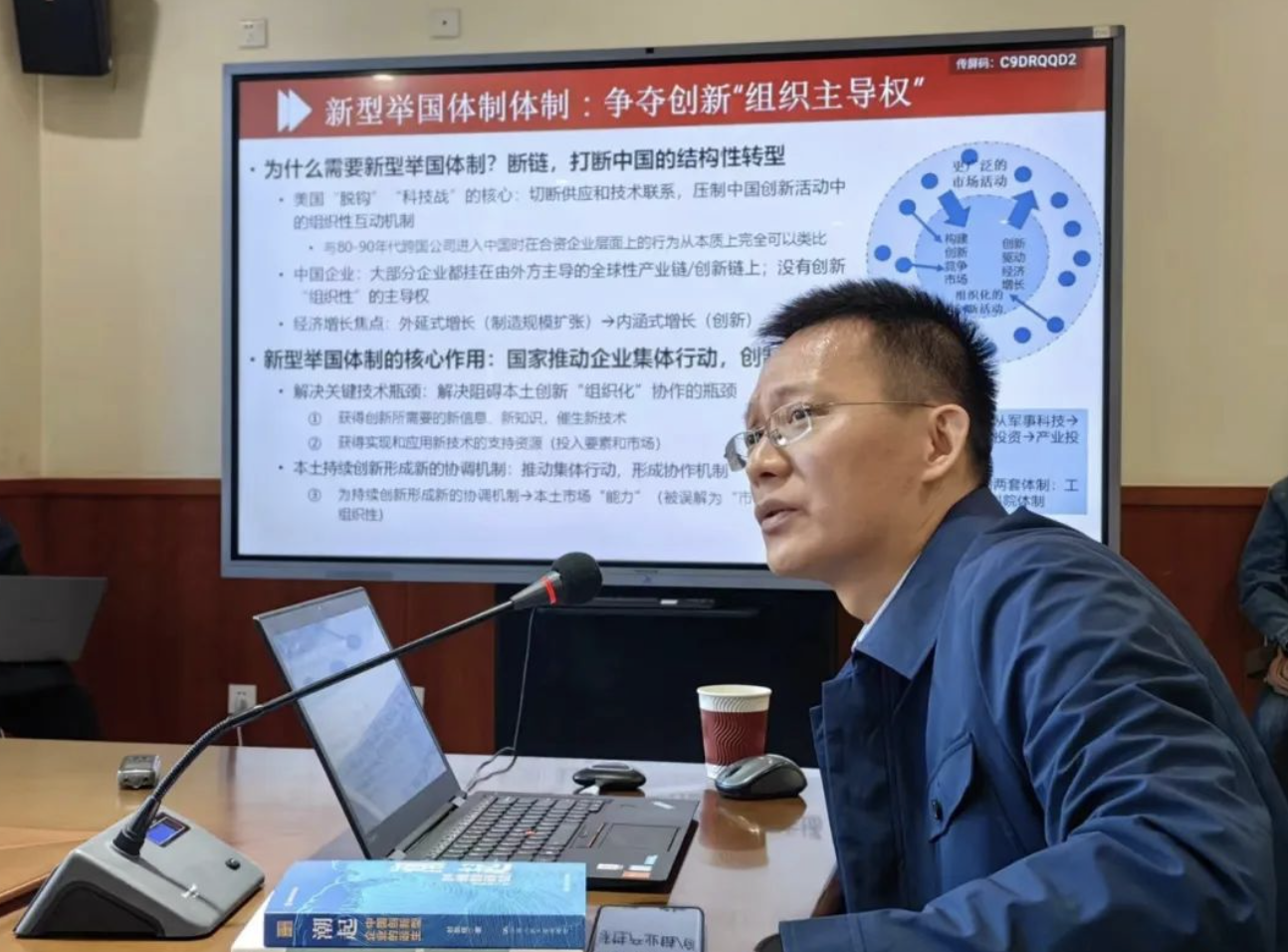
The first lecture of the “Autonomous Knowledge System Construction and New Perspectives in Area Studies” series was held at the School of International Studies, Peking University (PKU) on October 9. The seminar, titled “Rapid Industrialization, Globalization and ‘New Globalization’: Understanding Several Transformations of Contemporary China’s Industrial Development,” was hosted by the Institute of Area Studies, Peking University (PKUIAS). It was moderated by Lei Shaohua, an associate professor at PKU’s School of International Studies. Feng Kaidong, associate professor of PKU’s School of Government, gave the keynote speech.
Feng Kaidong first introduced two main ideas: “organization” and Alexander Gerschenkron’s crisis-driven system transformation. He explained that “organization” is key to understanding China’s industrial businesses and methods, and helps us grasp the changes in China’s industrial development. He noted that the Ford-style production model is weak facing external factors like markets, labor issues, and international relations, which led to more organizational flexibility in the modern industrial system. He also said that technological innovations need this flexibility and strong interactions within and between companies.
Feng Kaidong discussed the development of Chinese industry through various stages: from the planned economy era, to the “market for technology” era, to the “independent innovation” era, and the current period emphasizing a “new type of system.” He stated that during the planned economy era, administrative orders replaced organizational coordination, limiting companies’ ability to interact. Using Gerschenkron’s theory, he explained the change driven by the 1978 foreign exchange crisis, which led to China adopting its “market-for-technology” approach and forming joint ventures. This had a dual impact on Chinese industry – it led to “organizational” manufacturing and “de-organization” in technological activities. However, these “market-for-technology” companies failed to save China’s State industries because they lacked real innovation and the ability to develop it.
Feng also highlighted that market reforms paved the way for “independent innovation.” He clarified that the main difference between “independent innovation” companies and “market-for-technology” companies is in who controls the organization of technological activities. “Independent innovation” companies led technological learning by creating engineer-led organizations. Their rise showed how firms could become independent from global production networks controlled by developed countries and develop their own technology learning systems. This contributed to a structural change in China’s industrial strategy around 2005. However, due to a lack of a systemic view of industry and corporate strategy during national innovation transformation, the country did not fully develop organizational flexibility in the industrial system, nor did it provide favorable conditions for these independent innovation enterprises.
The transformation is not complete, as shown by the US imposing technology export controls on China and decoupling the industrial chain. The US action revealed China’s technological weaknesses in some industries. The root cause is that most Chinese companies are part of global chains led by foreign countries, lacking control over innovation organization. Feng noted that China urgently needs a systemic transformation due to external and internal pressures. He suggested this can only be resolved by government intervention. The government should encourage collective action among market players to overcome obstacles to local innovative collaboration and develop an organizational coordination mechanism for cutting-edge innovation. This is the essence of the new type of system. Once this system is in place, the government can gradually reduce its involvement.
In a discussion session, Lei Shaohua, an associate professor at PKU’s School of International Studies, talked with Feng about industrial policy, the “**system,” and the relationship between government and market. Zhang Yongle, deputy director of PKUIAS, believed that analyzing China’s industrial construction principles helps understand the construction of China’s knowledge system and provides a reference for studying the relationship between industrial systems and hegemonic systems in other regions and countries. Zan Tao, deputy director of PKUIAS, said that Chinese scholars’ research on their own history can extend to area studies, sparking deep comparative research. Area studies can advance through interaction and dialogue with national studies. Teachers and students also discussed topics like the rise and fall of “developmental countries,” the role of State and private enterprises under the new ** system, industrial upgrading, and new energy vehicles with Feng.


